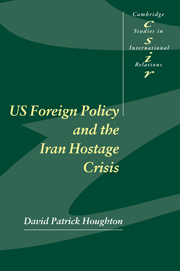Book contents
- Frontmatter
- Contents
- Preface
- 1 Jimmy Carter and the tragedy of foreign policy
- 2 Locating the argument: a review of the existing literature
- 3 The origins of the crisis
- 4 The waiting game
- 5 Days of decision: the hostage rescue mission
- 6 Hostages to history
- 7 Some alternative explanations: non-analogical accounts of the Iran decision-making
- 8 Conclusion
- Appendix 1 Dramatis personae
- Appendix 2 The major historical analogies used
- Bibliography
- Index
- CAMBRIDGE STUDIES IN INTERNATIONAL RELATIONS
7 - Some alternative explanations: non-analogical accounts of the Iran decision-making
Published online by Cambridge University Press: 22 September 2009
- Frontmatter
- Contents
- Preface
- 1 Jimmy Carter and the tragedy of foreign policy
- 2 Locating the argument: a review of the existing literature
- 3 The origins of the crisis
- 4 The waiting game
- 5 Days of decision: the hostage rescue mission
- 6 Hostages to history
- 7 Some alternative explanations: non-analogical accounts of the Iran decision-making
- 8 Conclusion
- Appendix 1 Dramatis personae
- Appendix 2 The major historical analogies used
- Bibliography
- Index
- CAMBRIDGE STUDIES IN INTERNATIONAL RELATIONS
Summary
Having addressed the question of how historical analogies are used by decision-makers, we now need to direct our attention to other, more concrete kinds of criticism which might be raised against the argument presented in the previous few chapters. One obvious potential problem with the analysis presented in chapters 3–5 is that we may have misrepresented events in the case study analysed here, and in so doing may have missed key variables accounting for the decisions taken. Other explanations are certainly possible as accounts of the decisions arrived at. Indeed, the hostage crisis has already been examined from a wide variety of theoretical angles in the existing literature, the vast majority of which offer ‘non-analogical’ accounts of the hostage crisis decision-making. Although much of this more narrowly seeks to explain the decision to mount the rescue mission, it seems sensible now to compare the ability of these explanations to account for as many aspects of the Iran decision-making as the account we have offered here. Doing so, we shall argue, helps to place the analogical argument in relation to other explanations which have been offered in the literature, and suggests that the former is not necessarily at all incompatible with some of the latter. Not all of the theoretical accounts examined here, we shall argue, should properly be considered rival explanations per se. The meaning of this statement should become clear as we move through the various theoretical accounts, and we shall return to the point having done so.
- Type
- Chapter
- Information
- US Foreign Policy and the Iran Hostage Crisis , pp. 166 - 201Publisher: Cambridge University PressPrint publication year: 2001



